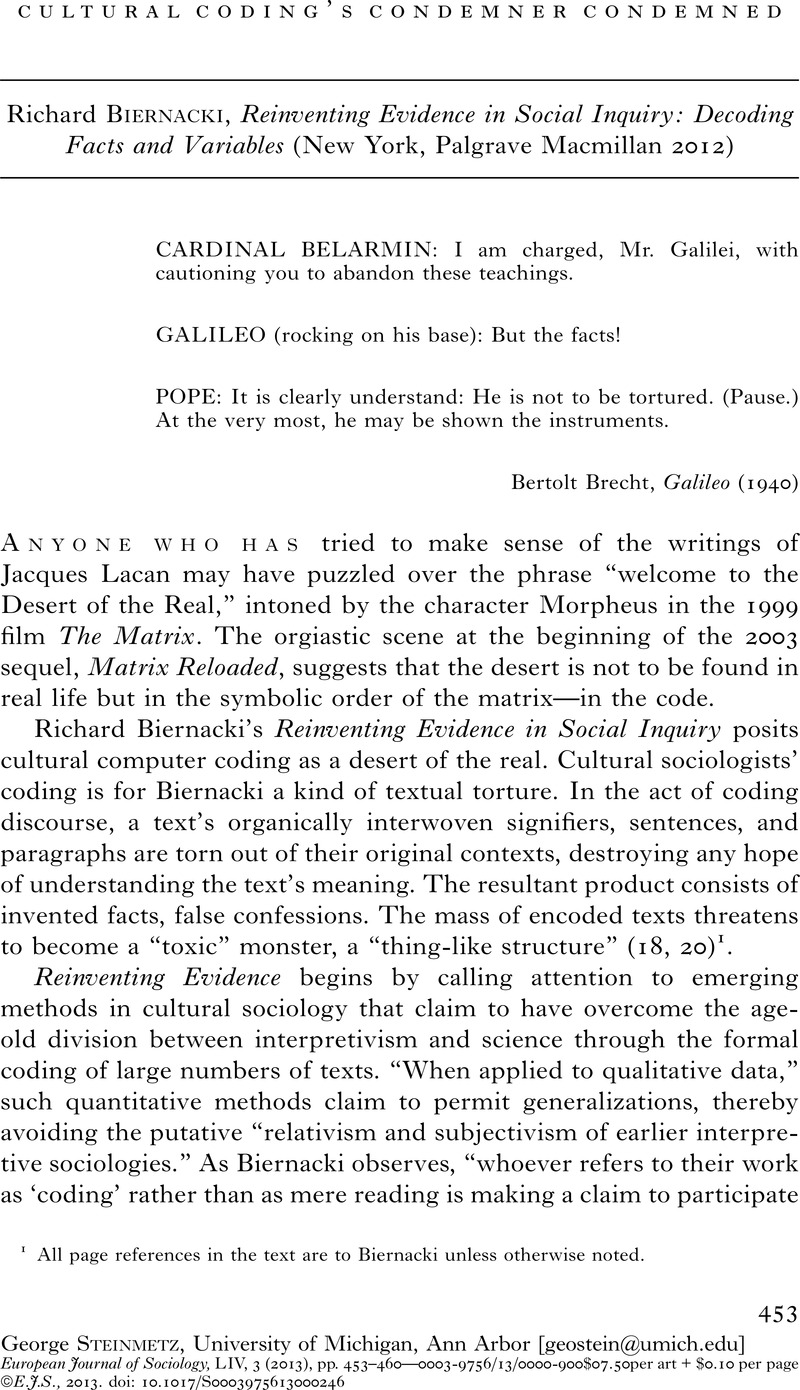Published online by Cambridge University Press: 22 January 2014

1 All page references in the text are to Biernacki unless otherwise noted.
2 Roland Barthes, Mythologies, New York: Hill and Wang, 2012 [1957].
3 George Steinmetz, “Reflections on the Role of Social Narratives in Working-Class Formation: Narrative Theory in the Social Sciences.” Social Science History vol. 16, number 3 (Fall), pp. 489-516.
4 Perrin Andrew. 2013. “Biernacki, ‘Reinventing Evidence’,” Scatterplot. The poetry in sociology (website), April 1, 2013. At http://scatter.wordpress.com/2013/04/01/biernacki-reinventing-evidence/. See also Ta-Nehisi Coates, “In Defense of a Loaded Word,” New York Times, Nov. 24, 2013, Sunday Review: 1-6.
5 For an early description of such research as quasi-industrial production based on a “subdivision of labour” in which “the answers, when suitably coded,” appear “as a series of holes punched in cards” by “girls” who can take “a short intensive course to become proficient in their jobs” see David Caradog Jones, Social Surveys, London: Hutchinson's University Library, 1949, p. 191.
6 Peter S. Bearman and Katherine Stovel, “Becoming a Nazi: A Model for Narrative Networks,” Poetics 27, p. 75.
7 Bearman and Stovel, “Becoming a Nazi,” p. 86.
8 Bearman and Stovel, “Becoming a Nazi,” p. 85.
9 Bearman and Stovel, “Becoming a Nazi,” p. 88.
10 See Mieke Bal, Narratology: Introduction to the Theory of Narrative, 3rd ed., Toronto: University of Toronto Press, 2009; David Herman, Narrative Theory: Core Concepts and Critical Debates, Columbus: Ohio State University Press, 2012; Fredric Jameson, The Political Unconscious: Narrative as a Socially Symbolic Act, Ithaca, NY: Cornell University Press, 1981.
11 Wendy Griswold, “The Fabrication of Meaning: Literary Interpretation in the United States, Great Britain, and the West Indies,” American Journal of Sociology 92(5), p. 1077.
12 Wendy Griswold, “The Fabrication of Meaning,” p. 1102.
13 John H. Evans, Playing God?/Human Genetic Engineering and the Rationalization of Public Bioethical Debate, Chicago, Chicago University Press, 2002.
14 Richard Biernacki, The Fabrication of Labor Germany and Britain, 1640-1914, Berkeley: University of California Press, 1995.
15 On the proximity between Berkeleyan idealism and the empiricist metaphysics of Hume (and J. S. Mill) see Ruth Groff, Ontology Revisited: Metaphysics in Social and Political Philosophy, New York, NY: Routledge, 2013, chs. 2-3.
16 E.g. Elizabeth A. Armstrong, Paula England, and Alison C. K. Fogarty, “Accounting for Women’s Orgasm and Sexual Enjoyment in College Hookups and Relationships,” American Sociological Review 77(3), pp. 435-462.
17 Scott Jaschik, “Intervention From On High,” Inside Higher Ed,’ http://www.insidehighered.com/news/2011/05/26/are_administrators_trying_to_involve_themselves_in_faculty_disputes/. See also Ayan Kusari, “Professor Published After Two-Year Court Battle,” The Guardian (University of California, San Diego); Peter Schmidt, “UC-San Diego Dean Violated Academic Freedom by Suppressing Paper, Faculty Allege,” Chronicle of Higher Education, 26, May 2011 (at http://chronicle.com.proxy.lib.umich.edu/blogs/ticker/uc-san-diego-dean-violated-academic-freedom-by-suppressing-paper-faculty-allege/33408).